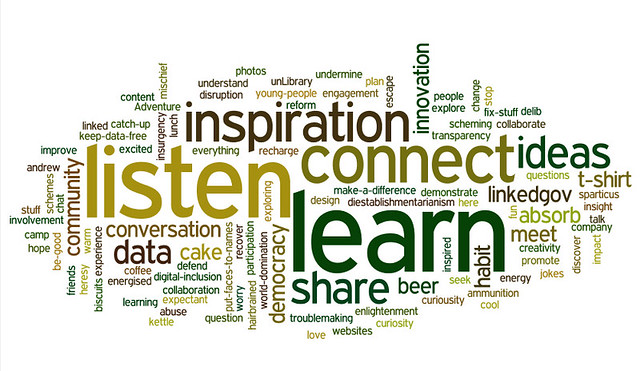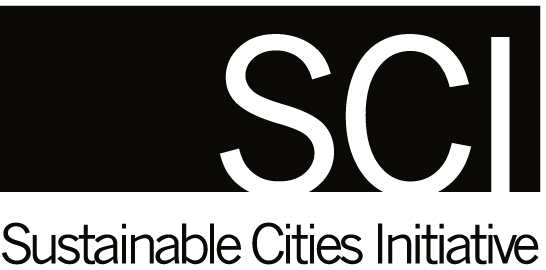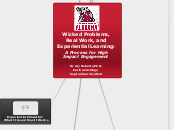
Wicked Problems, Real Work, and Experiential Learning: A Process for High Impact Engagement
Dr. Jay Roberts, Ph.D.
Earlham College
September 22, 2016

Introductions and Overview
Overview
Why EE Matters in a World of Seismic Disruption
Mid-Point Queries
EE: What it is and How it Works
Possibilities and Limitations
Discussion

Experiential Education: Why It Matters in a World of Seismic Disruption

Feb. 22, 2011 Christchurch Earthquake
Out of the rubble...
Stasis

Technology and The "Flattening World"

MOOC's!
Stanford’s Sebastian Thrun made headlines in the fall of 2011 when his on-line Artificial Intelligence course enrolled over 160,000 students. According to the New York Times (“Harvard and MIT Team Up To Offer On-Line Classes,” May 2, 2012)

The University of Nowhere
‘Place-based colleges’ are good for parties, but are becoming less crucial for learning thanks to the Internet, said the Microsoft founder Bill Gates at a conference on Friday.
Five years from now on the Web for free you’ll be able to find the best lectures in the world. It will be better than any single university,” he argued at the Techonomy conference in Lake Tahoe, Calif. “College, except for the parties, needs to be less place-based.”
from: http://chronicle.com/blogs/wiredcampus/bill-gates-predicts-technology-will-make-place-based-colleges-less-important-in-5-years/26092
Facebook Story: if someone from the 1950's suddenly appeared, what would be the most difficult thing to explain to them about life today?
I possess a device, in my pocket, that is capable of accessing the entirety of information known to humankind.
And I use it to look at funny videos of cats

The Great Recession of 2008
Affordability and Attendance
College Attendance: "In 1960, 392,000 students earned bachelor degrees. By 2007 that number had nearly quadrupled to 1.52 million."(Ferrall, 2011)
"In 2009, spending by Americans for post-secondary education totaled $461 billion, an amount 42% greater than in 2000, after accounting for inflation. This $461 billion is the equivalent of 3.3% of total U.S. gross domestic product (GDP) and an amount greater than the total GDP of countries such as Sweden, Norway and Portugal."
From: http://www.cnn.com/2011/12/02/opinion/vedder-college-costs/index.html
The credit crisis (student loan debt in US exceeds total credit card debt for first time in 2012)

The Rise of Collaborative Organizational Structures

Zappos Shoes "Holacracy"
"... a radical “self-governing” operating system where there are no job titles and no managers. The term Holacracy is derived from the Greek word holon, which means a whole that’s part of a greater whole. Instead of a top-down hierarchy, there’s a flatter “holarchy” that distributes power more evenly. The company will be made up of different circles—there will be around 400 circles at Zappos once the rollout is complete in December 2014—and employees can have any number of roles within those circles. This way, there’s no hiding under titles; radical transparency is the goal."
From: http://qz.com/161210/zappos-is-going-holacratic-no-job-titles-no-managers-no-hierarchy/
National Academies (2005). "Facilitating Interdisciplinary Research." Four drivers...
Inherent complexity of nature and society
The desire to explore problems and questions that are not confined to a single discipline
The need to solve social problems
The need to produce revolutionary insights and generative technologies

Meeting the Challenge?
"In survey after survey, employers seem to agree that the skill they most want in future workers is adaptability. Those who hire complain that they often find today’s college graduates lacking in interpersonal skills, problem solving, effective written and oral communication skills, teamwork, and the ability to think critically and analytically. Employers say that future workplaces need those skills as well as degree holders who can come up with novel solutions to problems and better sort through information to filter out the most critical pieces."
From: http://chronicle.com/blogs/next/2012/09/12/skills-gap-employers-and-colleges-point-fingers-at-each-other/
UNPREPARED?

Just over one-third of college faculty surveyed in 2007 strongly agreed that their campus actively promotes awareness of US or global social, political, and economic issues.
Only one-third of college students surveyed strongly agreed that their college education resulted in increased civic capacities.
ANEMIC SENSE OF PUBLIC SERVICE?

UNENGAGED?


With modern technology, if all there is is lectures, we don't need faculty to do it," Redish says. "Get 'em to do it once, put it on the web, and fire the faculty."
from: http://americanradioworks.publicradio.org/features/tomorrows-college/lectures/rethinking-teaching.html

A World of "Wicked" Problems

Climate Change

Income Inequality

Zika/Global Health

Terrorism

Water Rights

Racism, Hyper-Nationalism, Xenophobia
Solvable by any one discipline?
"Easily" solvable?
The world is full of complex, unscripted problems where the answers are not immediately known and the consequences matter.
Wicked Problems
Contested and Complex
Dispersed responsibility and power
High potential for unforeseen consequences
Uncertain, unclear data
Time stress

Does our current educational system prepare students to work in these kinds of contexts?
as
"By “disruptive moments,” I’m not referring to students on Facebook in classrooms... By using the phrase “disrupting ourselves” in this article’s title, I am asserting that one key source of disruption in higher education is coming not from the outside but from our own practices, from the growing body of experiential modes of learning, moving from margin to center, and proving to be critical and powerful in the overall quality and meaning of the undergraduate experience. As a result, at colleges and universities we are running headlong into our own structures, into the way we do business." (Bass, 2012)
"We might say that the formal curriculum is being pressured from two sides. On the one side is a growing body of data about the power of experiential learning in the co‑curriculum; and on the other side is the world of informal learning and the participatory culture of the Internet. Both of those pressures are reframing what we think of as the formal curriculum.
These pressures are disruptive because to this point we have funded and structured our institutions as if the formal curriculum were the center of learning, whereas we have supported the experiential co-curriculum (and a handful of anomalous courses, such as first-year seminars) largely on the margins, even as they often serve as the poster children for the institutions’ sense of mission, values, and brand. All of us in higher education need to ask ourselves: Can we continue to operate on the assumption that the formal curriculum is the center of the undergraduate experience?" (Bass, 2012)

High Impact Learning Practices (AAC&U, 2008)
Learning communities
Collaborative assignments and projects
Service learning, community based learning
Undergraduate research
Internships and project-based learning
Diversity/global learning
Immersion experiences

Transformation
"We all know or sense that the academy today is in the throes of transformation. The knowledge, skills, and values in which students should be educated; the intellectual landscape of the disciplines and degrees; the ways in which educational institutions are organized; the funding of teaching, learning, and research-- all of this promises to be profoundly different in 20 years. The forces of change have resulted partly from our own inertia, partly from consequences of our success, and partly from broad political, market, and technological developments not of our making. The question is not whether the academy will be changed, but how." (Scobey, 2012)
Purpose Learning
Stanford d.school

Possibilities and Limitations
Student Resistance
Time commitments- this isn't my only class
Non-traditional learning and assessment
Group work- "hell is other people"
Multiple learning modalities
Faculty Resistance
Time commitment
Team teaching
Scaling issues (can you do this with 100 people in a class?)
Social dimensions of learning
New teaching skill sets required
Faculty development, many paths, and "deep play"
Structural Resistance
Academic calendar
Team teaching and interdisciplinarity
Culture of Silos in the Academy
Tenure and promotion
Carrots, sticks, and systems-thinking
Final Queries
What would it look like if we placed student experience at the center of the purpose of the university?
How can we connect students to authentic and relevant problems to be examined and worked on locally, regionally, and globally?
How can we "Just Get Started"? And, how can we dream big?

The Real Work
It may be that when we no longer know what to do
we have come to our real work,
and that when we no longer know which way to go
we have come to our real journey.
The mind that is not baffled is not employed.
The impeded stream is the one that sings.
~ Wendell Berry

Experiential Education:
What It Is and How It Works

What is Experiential Education?

The Experiential Learning Cycle

Experiential education is a philosophy that informs many methodologies in which educators purposefully engage with learners in direct experience and focused reflection in order to increase knowledge, develop skills, clarify values, and develop people's capacity to contribute to their communities.

EE and Terms
Service Learning
Community-Based Learning
Project or Problem-Based Learning
Game-Based Learning
Active Learning
Cooperative Learning
Place-Based Learning
Inquiry-Based Learning
AEE's Principles
Experiential learning occurs when carefully chosen experiences are supported by reflection, critical analysis and synthesis.
Experiences are structured to require the learner to take initiative, make decisions and be accountable for results.
Throughout the educational process, the learner is actively engaged in posing questions, investigating, experimenting, being curious, solving problems, assuming responsibility, being creative, and constructing meaning.
Learners are engaged intellectually, emotionally, socially, soulfully and/or physically. This involvement produces a perception that the learning task is authentic.
The educator and learner may experience success, failure, adventure, risk-taking and uncertainty, because the outcomes of experience cannot totally be predicted.
The educator's primary roles include setting suitable experiences, posing problems, setting boundaries, supporting learners, insuring physical and emotional safety, and facilitating the learning process.
The design of the learning experience includes the possibility to learn from natural consequences, mistakes and successes.

Core Methodologies
Active Learning
University of Virginia Bay Game
Community-Based Learning

University of Oregon Sustainable Cities Initiative
Integrative Learning

Mt. Holyoke College
Problem-Based Learning

Team Magic Bus

Scales
Micro
Keep it simple!
One class, one experience
Meso
Go bigger!
An entire unit of a class; a semester project
Macro
Program level, unit level, institution-wide

Key Principles
Just Get Started
Don't do more; do different
Fail fast, fail forward
Think about assessment in the design itself

Queries
Is higher education experiencing seismic disruption? Is U of A?
Is our present system and structure of teaching and learning rising to the challenges in front of us?
What needs to change? What can we change?
